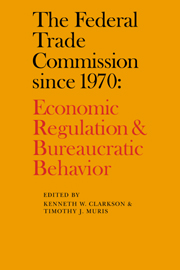Book contents
- Frontmatter
- Contents
- List of contributors
- Preface
- 1 Introduction
- Part I The institutional setting
- Part II Nature and consequence of FTC actions
- Introduction
- 6 Bureau of Competition: antitrust enforcement activities
- 7 Information for antitrust and business activity: line-of-business reporting
- 8 Industry structure investigations: Xerox's multiple patents and competition
- 9 Exclusionary practices: shopping center restrictive covenants
- 10 Legislative powers: FTC rule making
- 11 Rewriting consumer contracts: creditors' remedies
- 12 Regulating postpurchase relations: mobile homes
- 13 Regulating information: advertising overview
- 14 Special statutes: the structure and operation of the Magnuson-Moss Warranty Act
- Part III Conclusions and reforms
- Notes
- Selected bibliography
- Index
11 - Rewriting consumer contracts: creditors' remedies
Published online by Cambridge University Press: 05 November 2011
- Frontmatter
- Contents
- List of contributors
- Preface
- 1 Introduction
- Part I The institutional setting
- Part II Nature and consequence of FTC actions
- Introduction
- 6 Bureau of Competition: antitrust enforcement activities
- 7 Information for antitrust and business activity: line-of-business reporting
- 8 Industry structure investigations: Xerox's multiple patents and competition
- 9 Exclusionary practices: shopping center restrictive covenants
- 10 Legislative powers: FTC rule making
- 11 Rewriting consumer contracts: creditors' remedies
- 12 Regulating postpurchase relations: mobile homes
- 13 Regulating information: advertising overview
- 14 Special statutes: the structure and operation of the Magnuson-Moss Warranty Act
- Part III Conclusions and reforms
- Notes
- Selected bibliography
- Index
Summary
As Ellis has detailed in Chapter 10, in terms of its potential impact upon society, rule making is perhaps the most important activity that the Commission undertakes. Although Ellis addressed the overall Commission rule-making program, it is worthwhile to discuss in detail the Commission work on a particular rule. Thus, this chapter focuses on the Federal Trade Commission's (FTC) proposed Trade Regulation Rule (TRR) on Creditors' Remedies. Besides providing a look at Commission development of a rule, this chapter focuses on a major substantive part of the Commission's consumer protection program of recent years – rewriting consumer contracts.
The proposed TRR would prohibit consumers from waiving certain rights, such as the right to a hearing and rights under the state statutes that exempt certain property from attachment by creditors. Further, it would limit a creditor's security by, for example, eliminating cross-collateralization. Finally, in other relevant provisions, the TRR restricts creditors in taking assignments of debtors' wages, in obtaining deficiency judgments, and in collecting attorneys' fees.
Section I describes the philosophical viewpoint and empirical guidance that underlie the Bureau of Consumer Protection (BCP) proposal to ban or restrict certain collection procedures and practices that creditors presently employ when a consumer defaults. Section II criticizes the BCP arguments. Next, because the empirical evidence presented by the BCP at the time that the rule was proposed was sketchy, Section III presents findings from the empirical studies presented at the FTC hearings on the proposed TRR.
- Type
- Chapter
- Information
- The Federal Trade Commission since 1970Economic Regulation and Bureaucratic Behavior, pp. 184 - 203Publisher: Cambridge University PressPrint publication year: 1981

